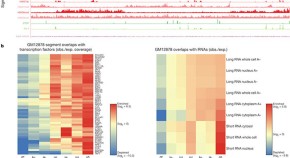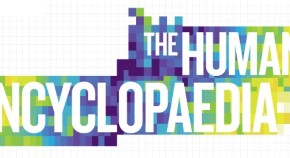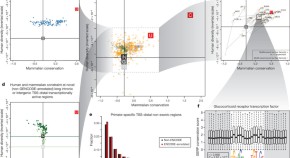Encode (original) (raw)
Threads
7 DNA methylation
ENCODE analysis identifies dynamic DNA methylation patterns and relationships to regulatory elements
ENCODE: The human encyclopaedia
First they sequenced it. Now they have surveyed its hinterlands. But no one knows how much more information the human genome holds, or when to stop looking for it.
News Feature5 Sep 2012 Nature
Lessons for big-data projects
To be successful, consortia need clear management, codes of conduct and participants who are committed to working for the common good, says ENCODE lead analysis coordinator Ewan Birney.
- Ewan Birney

ENCODE explained
The Encyclopedia of DNA Elements (ENCODE) project dishes up a hearty banquet of data that illuminate the roles of the functional elements of the human genome. Here, six scientists describe the project and discuss how the data are influencing research directions across many fields. See Articles p.57, p.75, p.83, p.91, p.101 & Letter p.109
- Joseph R. Ecker
- Wendy A. Bickmore
- Eran Segal
News & Views Forum5 Sep 2012 Nature
Research papers in Nature
An integrated encyclopedia of DNA elements in the human genome
This overview of the ENCODE project outlines the data accumulated so far, revealing that 80% of the human genome now has at least one biochemical function assigned to it; the newly identified functional elements should aid the interpretation of results of genome-wide association studies, as many correspond to sites of association with human disease.
- The ENCODE Project Consortium
ArticleOpen Access5 Sep 2012 Nature 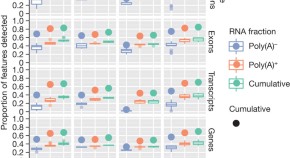
Landscape of transcription in human cells
A description is given of the ENCODE effort to provide a complete catalogue of primary and processed RNAs found either in specific subcellular compartments or throughout the cell, revealing that three-quarters of the human genome can be transcribed, and providing a wealth of information on the range and levels of expression, localization, processing fates and modifications of known and previously unannotated RNAs.
- Sarah Djebali
- Carrie A. Davis
- Thomas R. Gingeras
ArticleOpen Access5 Sep 2012 Nature 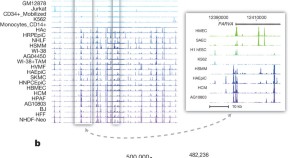
The accessible chromatin landscape of the human genome
An extensive map of human DNase I hypersensitive sites, markers of regulatory DNA, in 125 diverse cell and tissue types is described; integration of this information with other ENCODE-generated data sets identifies new relationships between chromatin accessibility, transcription, DNA methylation and regulatory factor occupancy patterns.
- Robert E. Thurman
- Eric Rynes
- John A. Stamatoyannopoulos
ArticleOpen Access5 Sep 2012 Nature - ArticleOpen Access5 Sep 2012 Nature
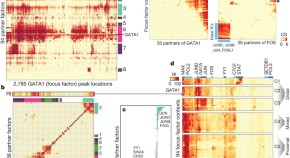
Architecture of the human regulatory network derived from ENCODE data
A description is given of the ENCODE consortium’s efforts to examine the principles of human transcriptional regulatory networks; the results are integrated with other genomic information to form a hierarchical meta-network where different levels have distinct properties.
- Mark B. Gerstein
- Anshul Kundaje
- Michael Snyder
ArticleOpen Access5 Sep 2012 Nature 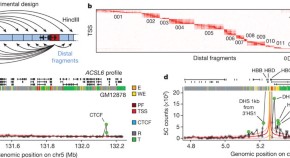
The long-range interaction landscape of gene promoters
Chromosome conformation capture carbon copy (5C) is used to look at the relationships between functional elements and distal target genes in 1% of the human genome in three dimensions; the study describes numerous long-range interactions between promoters and distal sites that include elements resembling enhancers, promoters and CTCF-bound sites, their genomic distribution and complex interactions.
- Amartya Sanyal
- Bryan R. Lajoie
- Job Dekker
LetterOpen Access5 Sep 2012 Nature
